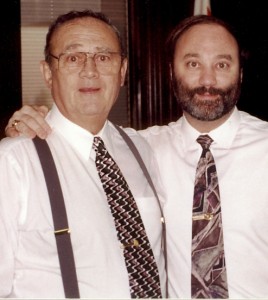There’s been a lot of press coverage concerning the Bruce/Caitlyn Jenner transgender issue. For some helpful perspective, you might wish to read a series of posts on the subject of gender dysphoria written by Christian psychologist Mark Yarhouse (pictured below). The series is on the Limning the Psyche blog, beginning at http://psychologyandchristianity.wordpress.com/2015/01/14/understanding-gender-dysphoria-pt-1/ (follow the links from there to the other parts in the series).
Author: GCI Media
Canadian pastor wed
Congratulations to GCI-Canada pastor Fraser Henderson and his bride Julie Shaw. The couple was wed on May 30. Fraser’s father, James Henderson, officiated. The intimate ceremony (pictured below) was held in the back yard of the home where the couple will reside.
Fraser serves as pastor of the Corwall, Ontario congregation and associate pastor of congregations in Ottawa and Smiths Falls.
Momentary happiness vs. lasting joy
Dear Brothers and Sisters,
I laughed out loud when I saw this scientific formula for happiness in an article [1] in Psychology Today:
 Though viewing this rather nonsensical formula brought me momentary happiness, it did not bring lasting joy. Don’t misunderstand; I enjoy a good laugh as much as anyone—that’s why I appreciate this statement from Karl Barth: “Laughter is the closest thing to the grace of God.” But though both happiness and joy can bring us to laughter, there’s an important distinction between them—a difference I experienced many years ago when my dad died (we’re pictured together at right). Obviously I was not happy about my dad’s passing, but I was calmed and encouraged by the joy I had knowing he was experiencing a new closeness to God in eternity. The thought of that glorious reality continues to give me joy.
Though viewing this rather nonsensical formula brought me momentary happiness, it did not bring lasting joy. Don’t misunderstand; I enjoy a good laugh as much as anyone—that’s why I appreciate this statement from Karl Barth: “Laughter is the closest thing to the grace of God.” But though both happiness and joy can bring us to laughter, there’s an important distinction between them—a difference I experienced many years ago when my dad died (we’re pictured together at right). Obviously I was not happy about my dad’s passing, but I was calmed and encouraged by the joy I had knowing he was experiencing a new closeness to God in eternity. The thought of that glorious reality continues to give me joy.
Depending on the translation, the Bible uses the words happy and happiness about 30 times, while joy and rejoice appear more than 300 times. In the Old Testament, the Hebrew word śāmâ (translated rejoice, joy and glad) is used to cover a wide range of human experiences: sex, marriage, the birth of children, harvest, victory and drinking wine (Song of Songs 1:4; Proverbs 5:18; Psalm 113:9; Isaiah 9:3 and Psalm 104:15). In the New Testament, the Greek word chara is used primarily for expressing joy in the redemptive works of God, the advent of his Son (Luke 2:10), and the resurrection of Jesus (Luke 24:41). As we read the New Testament, we see the word joy is more than an emotion; it is a characteristic of a Christian, part of the fruit produced by the inner working of the Holy Spirit.
We are familiar with joy being the result of good things as seen in the parables of the lost sheep, lost coin and lost son (Luke 15:2-24). Here the central figure representing God the Father is pictured as rejoicing over the recovery and reconciliation of that which was “lost.” Scripture also teaches us that true joy is not affected by surrounding circumstances including pain, agony and loss. Joy can be the result of suffering for Christ’s sake (Colossians 1:24). Jesus himself experienced great joy in facing the terrible suffering and shame of crucifixion (Hebrews 12:2).
Many of us have felt true joy knowing the reality of eternity, even as we’ve had to say good-bye to a loved one. This is true because there is an unbreakable relationship between love and joy. We see this in Jesus’ words as he summarized his teachings to his disciples: “I have told you this so that my joy may be in you and that your joy may be complete. My command is this: Love each other as I have loved you” (John 15:11-12). As we grow in God’s love, so does our joy grow. In fact, all the fruit of the Holy Spirit grows in us as we grow in love.
Paul helps us understand the difference between happiness and joy in his letter to the church in Philippi, which he wrote while imprisoned in Rome. In that letter he used the words joy, rejoice and joyful 16 times. I’ve visited many jails and prisons and you don’t typically find happy people there. Yet Paul found joy while chained in prison, not knowing if he would live or die. Due to his faith in Christ, he was content—through eyes of faith Paul saw his circumstances in an entirely different light than most people would. Note what he wrote:
Now I want you to know, brothers and sisters, that what has happened to me has actually served to advance the gospel. As a result, it has become clear throughout the whole palace guard and to everyone else that I am in chains for Christ. And because of my chains, most of the brothers and sisters have become confident in the Lord and dare all the more to proclaim the gospel without fear. (Philippians 1:12-14)
These powerful words came from an inner joy that Paul experienced despite his circumstances. He knew who he was in Christ, and who Christ was in him. He wrote:
I am not saying this because I am in need. I have learned to be content whatever the circumstances. I know what it is to be in need, and I know what it is to have plenty. I have learned the secret of being content in any and every situation, whether well fed or hungry, whether living in plenty or in want. I can do all this through him who gives me strength. (Philippians 4:11-13)
We can summarize the distinction between happiness and joy in many ways. Here are three:
- Happiness is temporary—often momentary or the result of short-term contentment. Joy is eternal and spiritual, keying off of who God is and what he has done, is doing and will yet do.
- Because happiness is dependent on many factors, it is fleeting and doesn’t deepen or mature. Joy matures as we grow in relationship with God and with each other.
- Happiness comes from temporal external events, observations and actions. Joy lies within you and comes from the work of the Holy Spirit.
Because God created us for fellowship with himself, nothing else can satisfy our souls and bring us lasting joy. Through faith, Jesus lives in us and we in him. Because we no longer live for ourselves, we are able to rejoice in all kinds of circumstances—even suffering (James 1:2), through which we join with Jesus who suffered on our behalf. Despite his great suffering in prison, Paul wrote this: “Rejoice in the Lord always. I will say it again: Rejoice!” (Philippians 4:4).
Jesus has called us to a life of self-giving on behalf of others. There is a great paradox in that life: “Whoever wants to save their life will lose it, but whoever loses their life for me will find it” (Matthew 16:25). As humans, we often go hours or even days without giving much thought to God’s glory, love and holiness. But I’m sure that once we see Christ in his full glory, we will thump our heads and say, “How could I have paid so much attention to other things?”
We do not yet see Christ as clearly as we would like; we live in the slums, so to speak, and find it hard to imagine places we have never been. We are too busy trying to survive the slum to dwell on the glories of God (see our article “The Joy of Salvation” at www.gci.org/gospel/joysalv).
The joy of eternity enables us to see the miseries of this life as opportunities to receive grace and know and trust God more deeply. We learn to appreciate the joys of eternity even more after we have struggled with the shackles of sin and the difficulties in this life. We will appreciate glorified bodies even more after we experience the pains of our physical bodies. I believe that is why Karl Barth said this: “Joy is the simplest form of gratitude.” We can be grateful that the joy set before Jesus, which enabled him to endure the cross, has also been set before us.
Feeling joyfully grateful,
Joseph Tkach.
[1] “The Happiness Equation,” Psychology Today, August 22, 2014, www.psychologytoday.com/blog/neuronarrative/201408/the-happiness-equation.
Update from the Philippines
Here are links to reports on recent ministry activity in GCI congregations in the Philippines:
- http://my.gci.ph/nd-guzon-visits-gci-cabanatuan-ordains-elder/ – Elder ordained.
- http://my.gci.ph/testimonies/ – Testimonies from an emerging young leaders’ retreat.
- http://my.gci.ph/bicol-summer-youth-camp/ – This is the recent SEP 2015 in the Bicol Region
NAE booklet on God & Science
 In the United States, GCI is a member of The National Association of Evangelicals (NAE) and president Joseph Tkach is an NAE board member.
In the United States, GCI is a member of The National Association of Evangelicals (NAE) and president Joseph Tkach is an NAE board member.
NAE recently launched a new website at http://nae.net/. The site includes many resources that you may find useful in your congregation or ministry. One of those resources is a free booklet, “When God and Science Meet: Surprising Discoveries of Agreement.” It addresses questions that arise at the intersection of faith and science. You may download a copy at http://nae.net/godandscience/.
Church Under the Tree
Greg Williams, GCI-USA director of Church Administration and Development, recently visited South Africa. Here is his video report on a visit to one of GCI’s churches there—known to many of us as “The Church Under the Tree.”
On YouTube at https://youtu.be/-XZnX5UgdiY.
Sunday school curriculum
 The teaching curriculum for this year’s Generations Ministries’ camps is titled Epic Story. As a companion, Gary Weldon, one of the staff members at the GenMin Pathways Camp in Ohio, wrote a curriculum with a similar theme for use with pre-teen campers. It’s titled JJ’s Epic Adventure. It would make an excellent curriculum to use in children’s Sunday school classes. Feel free to use it for that purpose.
The teaching curriculum for this year’s Generations Ministries’ camps is titled Epic Story. As a companion, Gary Weldon, one of the staff members at the GenMin Pathways Camp in Ohio, wrote a curriculum with a similar theme for use with pre-teen campers. It’s titled JJ’s Epic Adventure. It would make an excellent curriculum to use in children’s Sunday school classes. Feel free to use it for that purpose.
The curriculum is a wonderfully spun tale of JJ and friends encountering the Story Master, Ranger Chris and Umoya (the characters of the Trinity) at Epic Academy. The friends experience the unconditional love of the Lord and come to realize their personal story isn’t as boring and insignificant as they once thought; their stories are part of a much grander tale—the Epic Story! They find the adventure with God is full of life!
You will find JJ’s Epic Adventure curriculum along with a leader’s guide posted at www.generationsministries.org/camp-teaching-materials.html. The graphic above can be used for name tags for the kids. Our thanks to Gary for his good work!
16 baptized in the Philippines
Three GCI-Philippines congregations in Tabaco City gathered recently for the baptism of 16 men, women and children. To read about this joyous event, click here.
Youth camps
SEP Luzon
GCI-Philippines held a youth camp in Luzon in May (SEP Luzon). Against a backdrop of sea and sky, 144 campers and 40 staff gathered for six days of rediscovering what it means to Live the Life. This theme encouraged the young people to embrace, live out and share the fullness of the life we have been given in Jesus Christ. To read more about the camp, click here.
SEP Florida
Here is a video from the Generations Ministries camp held recently in Florida:
Learning to celebrate failures
In the church it’s easy to fall prey to the “success ethic” woven into the fabric of Western culture. But where in that ethic is there room to celebrate the failures that always are part of our journey as churches? A recent post on the Hatchery website (they are a church planting organization) helpfully addresses this topic. Go to: http://hatcheryla.com/learning-to-celebrate-failure-in-our-churches/.









